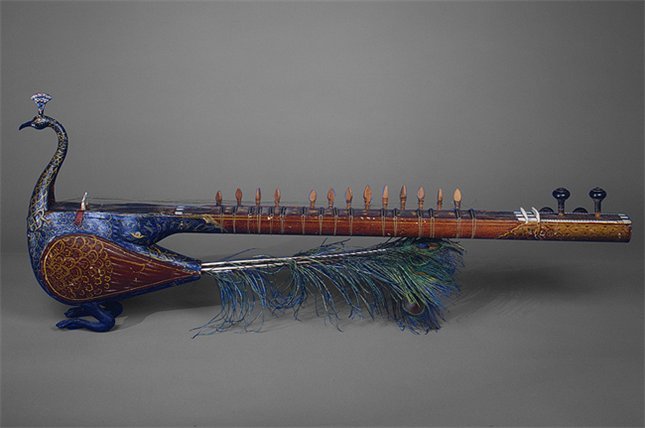FWP:
SETS == BHI; IZAFAT
MUSIC: {10,3}
Both Nazm and Bekhud Mohani are occupied with the exact nuances of the little word bhii . I find myself occupied with it too, because I keep thinking of its double meaning, 'even' and 'also'. In many verses it makes no great difference which way we interpret it. In at least one, {36,9}, the two interpretations lead to two amusingly different readings.
In the present verse, the 'also, too' reading suggests that the addressee already considers songs of joy, etc., to be a piece of luck, and is being urged simply to add songs of grief to that list, as another item in a set of similar ones. In contrast, the 'even' reading suggests a difference in category: the addressee is being urged to make a radical, qualitative change: even songs of grief, counterintuitively, should be considered to be a piece of luck.
And of course, how lucky exactly is a ;Ganiimat , which I've translated as a 'piece of luck'? The related ;Ganiim means 'taker of spoils, plunderer; enemy, foe, adversary' (Platts p.773). The root meaning of ;Ganiimat is connected with battle, and booty seized from an enemy; thus by extension it can mean a sudden stroke of luck, something that one could not have counted on. This etymology suggests a wry, pessimistic reading of the verse: consider even songs of grief to be booty precariously wrested from an enemy.
There's also a sort of colloquial sense of ;Ganiimat that I learned about only after the fact. I used to think that a ;Ganiimat was an unambiguously good thing, so I'd use it to compliment people: I thought it was an elegant touch to show off my vocabulary by describing, say, somebody's visit as a ;Ganiimat . But I noticed that whenever I did, there'd be a moment of silence, then genuine but somewhat awkward laughter all around, as though I'd made a slightly shocking but also witty remark. When I finally induced somebody to explain this reaction, I learned to my embarrassment that the (modern?) colloquial sense is something a bit wry, like 'as good as we're going to get' or 'don't look a gift horse in the mouth' or 'we're lucky to have even this much'. And that meaning too-- if it was current in Ghalib's day-- also fits wonderfully well into the present verse. For other examples of ;Ganiimat , see {175,7} and {414x,3}.
And who or what is yih saaz-e hastii , 'this musical instrument of existence'? The yih seems designed to give some immediateness and specificity to the concept. But thanks to the multivalence of the i.zaafat, it could be:
=this musical instrument that belongs to existence-- the heart itself, which is being addressed in the first line? the spirit? the body? the speaker's own self?
=this musical instrument that pertains to existence in some general way-- that generates it, the way a musical instrument produces a song? would this be the world itself, as a generator of songs of joy and grief? would this be the cycles of nature and time, that generate the tune of our lives?
=this musical instrument that is existence-- an instrument played perhaps by the hand of God?
In short, the yih is deceptive-- we are quite unable to pin down what kind of 'musical instrument of existence' is being evoked. Or perhaps it's even a little barb, to emphasize the undecideability before which we are helpless. If so, then this verse is reminiscent of the way we are taunted for our ignorance about the unfathomable cosmic musical instrument in {13,1}.
No wonder we had better take any songs at all as a 'piece of luck', a bit of booty snatched by fortunate chance from an enemy. Not only can we not pick and choose among the songs we play, or hear, or are-- we can't even know their nature or source. All we can know is our own approaching, inevitable loss. As Arshi suggests, {142,2} is an excellent verse for comparison.
Compare Mir's use of ;Ganiimat , in M{293,8}.

Nazm:
From the word bhii the meaning emerges that the way we wish for the melody of joy, in the same way we ought to consider the song of grief too a piece of luck. (89)
== Nazm page 89